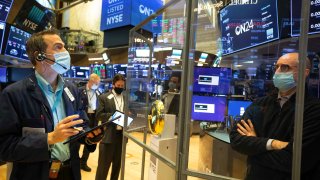
- Wall Street recovered its losses Tuesday after U.S. Federal Reserve Chairman Jerome Powell said inflation was still "soft" and committed to the Fed's current accommodative policy.
- Investors have been worried that a spike in prices due to an impending federal stimulus package, the reignition of the economy and pent up consumer demand, could force the central bank to raise short-term borrowing costs.
- High growth tech companies have been hit hard, having benefited from expectations of lower interest rates for an extended period of time.
A pullback in many stock markets has been overdue, but strong fundamentals and company earnings mean the current wobble is a buying opportunity, according to Mehvish Ayub, senior investment strategist at State Street Global Advisors.
Wall Street recovered its losses Tuesday after U.S. Federal Reserve Chairman Jerome Powell said inflation was still "soft" and committed to the Fed's current accommodative policy.
Powell's comments seemed to assuage some of the concerns about impending inflation that have driven a sharp rise in the benchmark U.S. 10-year Treasury yields, and brought stock markets down from near record highs over the past week.
Get Connecticut local news, weather forecasts and entertainment stories to your inbox. Sign up for NBC Connecticut newsletters.
Investors have been worried that a spike in prices due to an impending federal stimulus package, the reignition of the economy and pent up consumer demand, could force the central bank to raise short-term borrowing costs.
Speaking to CNBC's "Capital Connection" on Wednesday, Ayub noted that the shift in financial conditions and improvement in growth and inflation expectations had led the U.S. 10-year yield to simply retrace some of the steep decline it saw between December 2019 to June 2020, when the Covid-19 crisis took hold.
Money Report
"I think the important thing to note is that the Fed has not anywhere in its policy suggested it will suppress all financial conditions. It has a target for price stability and for employment," Ayub said.
She noted that core inflation — which excludes food and energy prices — is still somewhat lower, indicating that the current rise in short-term inflation expectations is "likely to be transient."
"We were ripe for a correction in some instances, if you think about the speed and the magnitude of the moves that we have seen across global equity markets," Ayub said. A "correction" is generally referred to as a 10% drop in an asset or market from its most recent high.
Many of the tech megastocks which saw stratospheric share price rises power the stock market recovery after the March 2020 downturn have been victims of the recent shift, with investors looking toward more cyclical stocks which tend to align with economic conditions.
Mikhail Zverev, head of global equities at Aviva Investors, told CNBC Wednesday that many of these growth stocks — those of companies operating a significant and sustainable positive cash flow, with greater future earnings and faster-growing revenues than industry peers — had benefited from the low interest rate environment
"There are a number of high growth names which had a spectacular 2020, and some of that surely was fundamentals, but a lot of that was positioning based on the lower for longer interest rate view, and some unwind to that, I think, is long overdue."
Tesla was one such example, losing 8.55% on Monday for its worst day since September 2020 and leaving the stock down slightly since the turn of the year. Tesla shares are still up 162.5% from their March 2020 low, however.
"Over the last few weeks, if anything we have actually had very good fundamentals," Ayub pointed out. "We have had really good earnings, particularly if we look at the S&P 500."
With around 80% of companies on Wall Street's flagship blue-chip index having reported earnings at this stage, the vast majority have met or exceeded profit expectations.
"The fundamentals there remain good, and if anything, I think this is an opportunity to buy on the dip," Ayub concluded.






